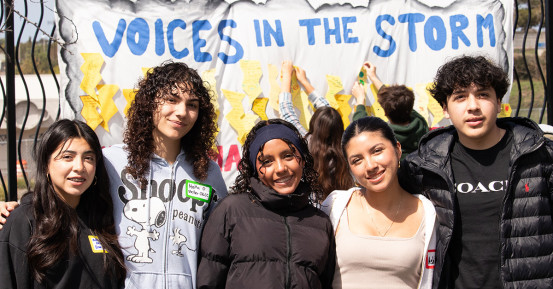Novel Intervention in Senior Housing Communities Increases Resilience and Wisdom
Raise Your Resilience program focuses on gratitude, positive attitude toward aging and value-based activities
Published Date
By:
- Michelle Brubaker
Share This:
Article Content
The United States Census Bureau estimates that by 2060, nearly one in four Americans will be age 65 and older. As America turns increasingly gray, numerous stressors, such as declining health, loss of loved ones or independence, negatively impact the lives of older adults.
Resilience improves the ability to cope with these stressors, but only one-third of older adults score high on resilience measures. In a new study, researchers at University of California San Diego School of Medicine, in collaboration with Mather Institute, described a method to enhance resilience and reduce subjective stress in residents living in senior housing communities.
The multi-site study, published in the February 5, 2019 online issue of International Psychogeriatrics, used an intervention program called Raise Your Resilience (RYR) and found an increase in resilience and wisdom, as well as a significant reduction in the level of daily stress experienced by seniors.
“The increase in the score on a scale to measure wisdom was a pleasant surprise. Psychosocial interventions are beneficial to older adults, but few have been implemented in the senior housing community setting,” said senior author Dilip V. Jeste, MD, senior associate dean for the Center of Healthy Aging and Distinguished Professor of Psychiatry and Neurosciences at UC San Diego School of Medicine. “We found the senior housing communities to be excellent sites for a group intervention. We went directly into the actual environment in which many older adults reside and face their everyday difficulties.”
RYR addresses topics like gratitude and ageism, and employs value-based activities emphasizing empathy, compassion and self-compassion.
For example, group members were asked to record one event each day that made them feel happy or grateful and one activity that made them feel proud. “Satisfaction with the intervention was quite high among the participants. Almost all of them completed their diary on most days, which was remarkable,” said Danielle Glorioso, LCSW, executive director of the Center for Healthy Aging at UC San Diego.
The study involved a one-month control period and a one-month intervention period. Participants were then followed for three months post-intervention. The study was conducted in five senior housing communities across three states: California, Illinois and Arizona. Eighty-nine participants were recruited for the study, with an average age of 85. Three-fourths were female and almost all the participants were white.
RYR was delivered in three 90-minute sessions by residential staff who were not licensed therapists but were trained by the researchers. Most psychosocial interventions require specialized therapists with advanced education to conduct the intervention, which is often expensive and impractical. “Our intervention can be easily duplicated at a low cost,” said Jeste, “which suggests a high potential for its implementation and dissemination across similar communities nationally.”
When compared to the control period, RYR participants had significantly lower stress scores and higher wisdom scores during the intervention period with significantly higher scores in resilience post-intervention. “Our results show that something can be done in a practical way to empower seniors,” said Jeste.
Future steps include studies with a more diverse group of participants from racial/ethnic and socioeconomic perspectives, and use of technology-assisted interventions.
Co-authors include: Emily Treichler, Ellen Lee, Tsung-Chin Wu, Xin Tu, and Rebecca Daly, all at UC San Diego; and Catherine O’Brien and Jennifer Smith, Mather Institute.
This research was funded, in part, by the National Institute of Mental Health T32 Geriatric Mental Health Program (Grant MH019934, R01MH094151-01), the Mather Institute and the Sam and Rose Stein Institute for Research on Aging, University of California San Diego.
Disclosure: Co-authors Catherine O’Brien and Jennifer Smith are employees of the Mather Institute.
Share This:
You May Also Like
Stay in the Know
Keep up with all the latest from UC San Diego. Subscribe to the newsletter today.



